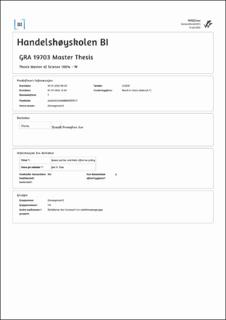| dc.contributor.author | Aas, Henrik Fransplass | |
| dc.date.accessioned | 2022-12-12T13:18:26Z | |
| dc.date.available | 2022-12-12T13:18:26Z | |
| dc.date.issued | 2022 | |
| dc.identifier.uri | https://hdl.handle.net/11250/3037293 | |
| dc.description | Masteroppgave (MSc) in Master of Science in Applied Economics - Handelshøyskolen BI, 2022 | en_US |
| dc.description.abstract | This paper examines the effect of green parties on environmental policy in
Norway. Environmental policy is measured through the share of bike roads,
number of charging stations for electric vehicles per capita, and environmental
score given by an impartial organization for each municipality.
The paper uses a regression discontinuity design on municipal data in Norway to
answer the research question. It takes advantage of high-quality political data
from the Local Government Dataset (Fiva et al., 2020) and publicly available data
from SSB on environmental variables.
The paper also investigates if there exists an incumbency effect on local and
national elections from winning a local municipal election for the Green party. It
uses the methods presented in Folke (2014) for estimating the threshold for
winning a seat. A descriptive analysis is implemented for the outcome variables to
extend on their relevance as measurement of environmental quality.
The treatment group is municipalities where the Green party wins exactly one seat
in the local council. The control group is the municipalities where the Green party
wins no seats when they run for election.
The paper concludes that green parties has no or little significant effect on local
environmental policy. I also find no evidence to support the existence of an
incumbency effect in future local or national elections for the Green party. | en_US |
| dc.language.iso | eng | en_US |
| dc.publisher | Handelshøyskolen BI | en_US |
| dc.subject | applied economics | en_US |
| dc.title | Green parties and their effect on policy | en_US |
| dc.type | Master thesis | en_US |

